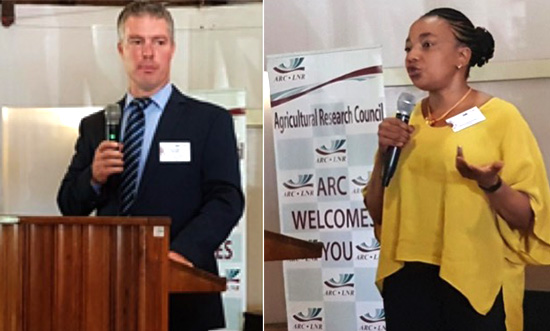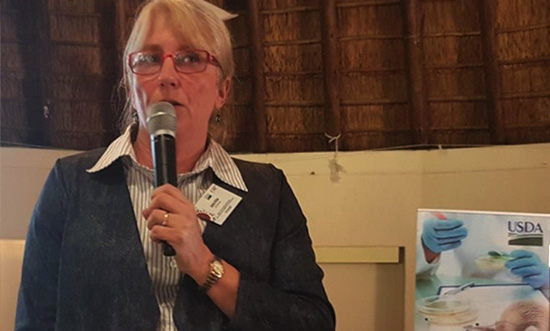Dr Jeromy McKin, USDA-APHIS (left) and Dr Mpho Maja, DAH-DAFF, delivering opening remarks. Pictures © M. Letshwenyo (oie) 2018.
The OIE, in collaboration with the United States Department of Agriculture – Animal and Plant Health Inspection Service (USDA-APHIS) Regional Office for Southern Africa, and the Onderstepoort Veterinary Research Institute (OVI) of South Africa, organised a training workshop on Avian Influenza (AI) Surveillance for OIE focal points for animal disease notification and for wildlife surveillance, for the Southern African Development Community (SADC) region.
The workshop was held at the OVI, an OIE Reference Centre, and was attended by participants from Angola, Botswana, Democratic Republic of Congo, Madagascar, Malawi, Mozambique, Lesotho, Namibia, South Africa, Zambia and Zimbabwe. It was officially opened by the Director Animal Health (DAH) of the Republic of South Africa, Dr Mpho Maja. In addition, representatives from USDA-APHIS (Mr Jeromy McKin) and OIE (Dr. Moetapele Letshwenyo) also gave opening remarks. Speakers underscored the importance of AI and the threat it poses to both animal and human live in the region and globally.
In order to set the stage, presentations were delivered by OIE and FAO on the regional and global distribution of AI, as well as OIE standards pertaining to the disease. Countries in the SADC region, affected by the disease (i.e. DRC, Zimbabwe and South Africa), as well as Uganda in East Africa shared their experiences dealing with the outbreaks, challenges, socio-cultural and political issues as well as the lessons learned. They also presented on the latest situation regarding AI in their countries. The rest of the time was used for real-life demonstrations to participants, giving them practical hands-on practice on sampling birds and the environment for avian influenza viruses, as well as conducting bird autopsies, collecting autopsy samples, preserving, packaging and transporting them to the laboratory.
Dr Andrea Britton, OIE Programme Officer. Picture © M. Letshwenyo (oie) 2018.

